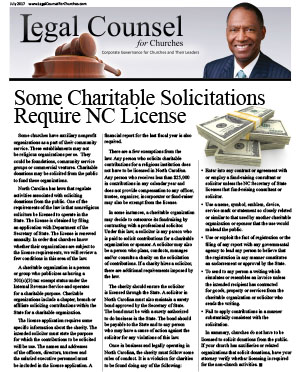Some churches have auxiliary nonprofit organizations as a part of their community service. These establishments may not be religious organizations per se. They could be foundations, community service groups or commercial ventures. Charitable donations may be solicited from the public to fund these organizations.
North Carolina has laws that regulate activities associated with soliciting donations from the public. One of the requirements of the law is that nonreligious solicitors be licensed to operate in the State. The license is obtained by filing an application with Department of the Secretary of State. The license is renewed annually. In order that churches know whether their organizations are subject to the license requirements, we will review a few conditions in this area of the law.
A charitable organization is a person or group who publicizes as having a 501(c)(3) tax exempt status under the Internal Revenue Service and operates for a charitable purpose. Charitable organizations include a chapter, branch or affiliate soliciting contributions within the State for a charitable organization.
The license application requires some specific information about the charity. The intended solicitor must state the purpose for which the contributions to be solicited will be use. The names and addresses of the officers, directors, trustees and the salaried executive personnel must be included in the license application. A financial report for the last fiscal year is also required.
There are a few exemptions from the law. Any person who solicits charitable contributions for a religious institution does not have to be licensed in North Carolina. Any person who receives less than $25,000 in contributions in any calendar year and does not provide compensation to any officer, trustee, organizer, incorporator or fund-raiser may also be exempt from the license.
In some instances, a charitable organization may decide to outsource its fundraising by contracting with a professional solicitor. Under this law, a solicitor is any person who is paid to solicit contributions for a charitable organization or sponsor. A solicitor may also be a person who plans, conducts, manages and/or consults a charity on the solicitation of contributions. If a charity hires a solicitor, there are additional requirements imposed by the law.
The charity should ensure the solicitor is licensed through the State. A solicitor in North Carolina must also maintain a surety bond approved by the Secretary of State. The bond must be with a surety authorized to do business in the State. The bond should be payable to the State and to any person who may have a cause of action against the solicitor for any violations of this law.
Once in business and legally operating in North Carolina, the charity must follow some rules of conduct. It is a violation for charities to be found doing any of the following:
- Enter into any contract or agreement with or employ a fund-raising consultant or solicitor unless the NC Secretary of State licenses that fund-raising consultant or solicitor.
- Use a name, symbol, emblem, device, service mark or statement so closely related or similar to that used by another charitable organization or sponsor that the use would mislead the public.
- Use or exploit the fact of registration or the filing of any report with any governmental agency to lead any person to believe that the registration in any manner constitutes an endorsement or approval by the State.
- To send to any person a writing which simulates or resembles an invoice unless the intended recipient has contracted for goods, property or services from the charitable organization or solicitor who sends the writing.
- Fail to apply contributions in a manner substantially consistent with the solicitation.
In summary, churches do not have to be licensed to solicit donations from the public. If your church has auxiliaries or related organizations that solicit donations, have your attorney verify whether licensing is required for the non-church activities.

